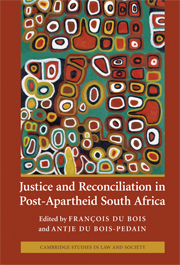Book contents
- Frontmatter
- Contents
- List of tables and figures
- List of contributors
- Acknowledgements
- List of abbreviations
- Introduction
- 1 Reconciliation as surrender: configurations of responsibility and memory
- 2 Radical forgiveness: transforming traumatic memory beyond Hannah Arendt
- 3 Communicating criminal and political responsibility in the TRC process
- 4 The contribution of criminal justice
- 5 Reparation and the forms of justice
- 6 Land restitution and reconciliation in South Africa
- 7 For justice and reconciliation to come: the TRC archive, big business and the demand for material reparations
- 8 Transition, forgiveness and citizenship: the TRC and the social construction of forgiveness
- 9 The evolving legitimacy of the South African Constitutional Court
- 10 Drawing the line: justice and the art of reconciliation
- 11 Post-conflict justice and the reconciliatory paradigm: the South African experience
- Index
- References
5 - Reparation and the forms of justice
Published online by Cambridge University Press: 01 July 2009
- Frontmatter
- Contents
- List of tables and figures
- List of contributors
- Acknowledgements
- List of abbreviations
- Introduction
- 1 Reconciliation as surrender: configurations of responsibility and memory
- 2 Radical forgiveness: transforming traumatic memory beyond Hannah Arendt
- 3 Communicating criminal and political responsibility in the TRC process
- 4 The contribution of criminal justice
- 5 Reparation and the forms of justice
- 6 Land restitution and reconciliation in South Africa
- 7 For justice and reconciliation to come: the TRC archive, big business and the demand for material reparations
- 8 Transition, forgiveness and citizenship: the TRC and the social construction of forgiveness
- 9 The evolving legitimacy of the South African Constitutional Court
- 10 Drawing the line: justice and the art of reconciliation
- 11 Post-conflict justice and the reconciliatory paradigm: the South African experience
- Index
- References
Summary
INTRODUCTION
‘Repairing the past’ is commonly regarded as integral to undoing historical injustice. Claims for reparations form part of the discourse concerning the duties owed to descendants of colonised and enslaved people by the descendants of their masters, and have featured in the various political transformations that have become emblematic of transitions to democracy. South Africa, which falls into both these categories, is no exception. The interim Constitution of 1993, which governed the transition from apartheid, specifically addressed two types of past injustices. It provided, first, for reparations in respect of ‘the acts, omissions and offences associated with political objectives and committed in the course of the conflicts of the past’, and, second, for the restitution of land dispossessed ‘under any law which would have been inconsistent with’ the prohibition on unfair discrimination in the interim Constitution ‘had that … [prohibition] been in operation at the time of the dispossession’.
While often viewed as indispensable, the status and scope of the duty to ‘repair the past’ is nevertheless controversial and uncertain. It is beset by theoretical and practical problems, and often has to give way to competing priorities. This, too, is evidenced in South Africa, where the transitional legal arrangements also shielded those responsible for gross human rights violations – both the direct perpetrators and the organisations behind them – from civil as well as criminal liability, and guaranteed the protection of existing land titles.
- Type
- Chapter
- Information
- Justice and Reconciliation in Post-Apartheid South Africa , pp. 116 - 143Publisher: Cambridge University PressPrint publication year: 2009
References
- 2
- Cited by



